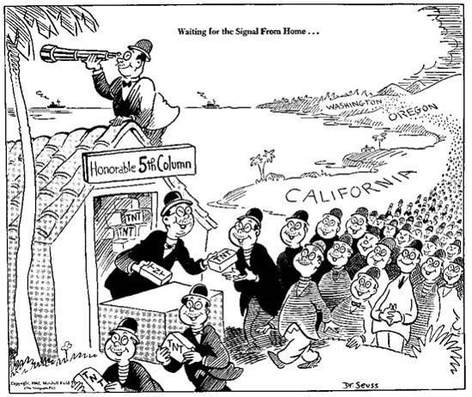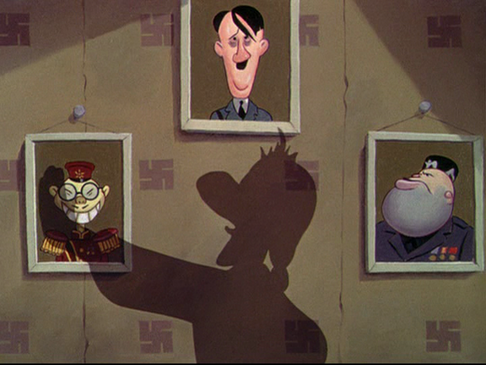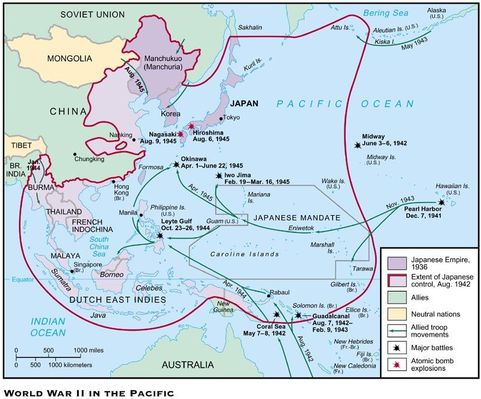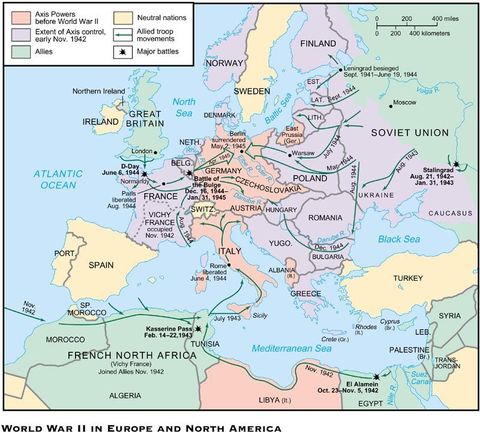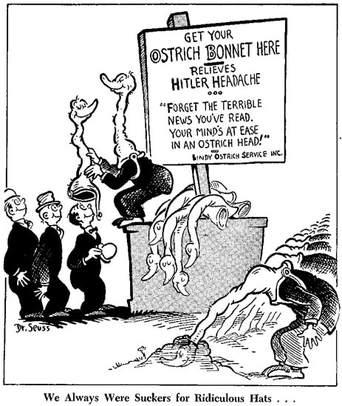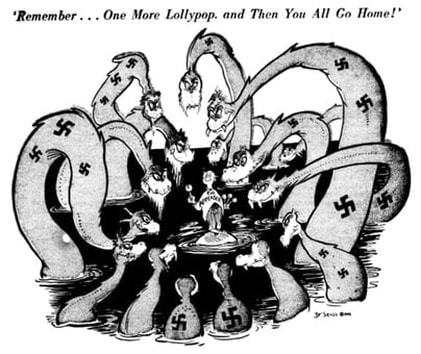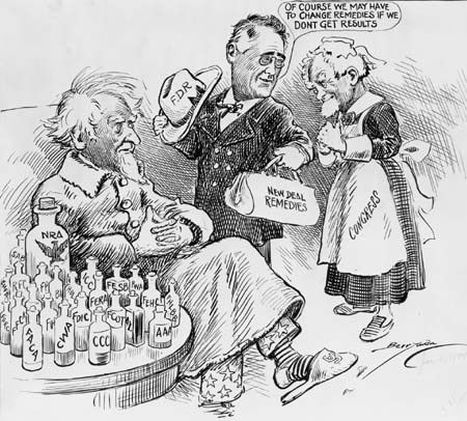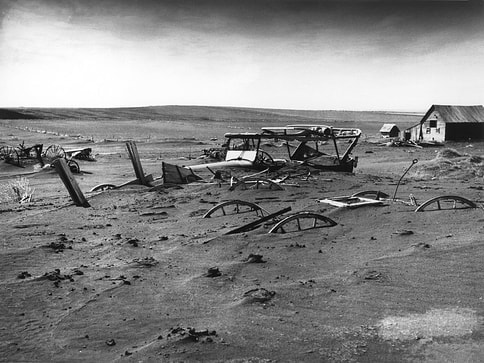|
Learning Target:
I can explain the opportunities & hardships the war created for Americans on the homefront. Critical Vocabulary: Benito Mussolini, Adolf Hitler, Third Reich, Emperor Hirohito,Neutrality Acts, "Cash-and-Carry,” General Francisco, Berlin-Rome Axis, "Rape of Nanking," "Quarantine Speech,” Munich Conference, Non-Aggression Pact, "Battle of Britain," "Arsenal of Democracy,” "Lend-Lease" Bill, American First Committee, Atlantic Charter, General Hideki Tojo, Pearl Harbor, General Douglas MacArthur, Battle of the Coral Sea, Battle of Midway, "Island-Hopping," Iwo Jima, Okinawa, General Dwight David Eisenhower, General Omar Bradley, General George S. Patton, Battle of Stalingrad, D-Day, “Battle of the Bulge,” War Resources Board, National War Labor Board, War Labor Disputes Act, Office of Price Administration, Office of Scientific Research and Development, “Manhattan Project,” Women's Army Auxiliary Corps, WAVEs, "Tuskegee Airmen," "Codetalkers,” "Rosie the Riveter,” "Double-V," "Zoot Suit Riots," Office of War Information, Executive Order 9066, Korematsu v. United States, Tehran Conference, United Nations, Yalta Conference, Potsdam Conference, Hiroshima, Nagasaki Today's Agenda:
Homework: World War II Tentative Test Date: March 29 Learning Target:
I can explain the opportunities & hardships the war created for Americans on the homefront. Critical Vocabulary: Benito Mussolini, Adolf Hitler, Third Reich, Emperor Hirohito,Neutrality Acts, "Cash-and-Carry,” General Francisco, Berlin-Rome Axis, "Rape of Nanking," "Quarantine Speech,” Munich Conference, Non-Aggression Pact, "Battle of Britain," "Arsenal of Democracy,” "Lend-Lease" Bill, American First Committee, Atlantic Charter, General Hideki Tojo, Pearl Harbor, General Douglas MacArthur, Battle of the Coral Sea, Battle of Midway, "Island-Hopping," Iwo Jima, Okinawa, General Dwight David Eisenhower, General Omar Bradley, General George S. Patton, Battle of Stalingrad, D-Day, “Battle of the Bulge,” War Resources Board, National War Labor Board, War Labor Disputes Act, Office of Price Administration, Office of Scientific Research and Development, “Manhattan Project,” Women's Army Auxiliary Corps, WAVEs, "Tuskegee Airmen," "Codetalkers,” "Rosie the Riveter,” "Double-V," "Zoot Suit Riots," Office of War Information, Executive Order 9066, Korematsu v. United States, Tehran Conference, United Nations, Yalta Conference, Potsdam Conference, Hiroshima, Nagasaki Today's Agenda:
Homework: World War II Tentative Test Date: March 29 Learning Target:
I can analyze the military strategies the United States & its allies pursued during World War II. Critical Vocabulary: Benito Mussolini, Adolf Hitler, Third Reich, Emperor Hirohito, Neutrality Acts, "Cash-and-Carry,” General Francisco, Berlin-Rome Axis, "Rape of Nanking," "Quarantine Speech,” Munich Conference, Non-Aggression Pact, "Battle of Britain," "Arsenal of Democracy,” "Lend-Lease" Bill, American First Committee, Atlantic Charter, General Hideki Tojo, Pearl Harbor, General Douglas MacArthur, Battle of the Coral Sea, Battle of Midway, "Island-Hopping," Iwo Jima, Okinawa, General Dwight David Eisenhower, General Omar Bradley, General George S. Patton, Battle of Stalingrad, D-Day, “Battle of the Bulge,” War Resources Board, National War Labor Board, War Labor Disputes Act, Office of Price Administration, Office of Scientific Research and Development, “Manhattan Project,” Women's Army Auxiliary Corps, WAVEs, "Tuskegee Airmen," "Codetalkers,” "Rosie the Riveter,” "Double-V," "Zoot Suit Riots," Office of War Information, Executive Order 9066, Korematsu v. United States, Tehran Conference, United Nations, Yalta Conference, Potsdam Conference, Hiroshima, Nagasaki Today's Agenda:
Homework: World War II Tentative Test Date: March 29 Learning Target:
I can analyze the military strategies the United States & its allies pursued during World War II. Critical Vocabulary: Benito Mussolini, Adolf Hitler, Third Reich, Emperor Hirohito,Neutrality Acts, "Cash-and-Carry,” General Francisco, Berlin-Rome Axis, "Rape of Nanking," "Quarantine Speech,” Munich Conference, Non-Aggression Pact, "Battle of Britain," "Arsenal of Democracy,” "Lend-Lease" Bill, American First Committee, Atlantic Charter, General Hideki Tojo, Pearl Harbor, General Douglas MacArthur, Battle of the Coral Sea, Battle of Midway, "Island-Hopping," Iwo Jima, Okinawa, General Dwight David Eisenhower, General Omar Bradley, General George S. Patton, Battle of Stalingrad, D-Day, “Battle of the Bulge,” War Resources Board, National War Labor Board, War Labor Disputes Act, Office of Price Administration, Office of Scientific Research and Development, “Manhattan Project,” Women's Army Auxiliary Corps, WAVEs, "Tuskegee Airmen," "Codetalkers,” "Rosie the Riveter,” "Double-V," "Zoot Suit Riots," Office of War Information, Executive Order 9066, Korematsu v. United States, Tehran Conference, United Nations, Yalta Conference, Potsdam Conference, Hiroshima, Nagasaki Today's Agenda:
Homework: World War II Tentative Test Date: March 29
Learning Target:
I can summarize the origins of World War II, & I can assess the American response to the growing international crisis from 1935-1941. Critical Vocabulary: Benito Mussolini, Adolf Hitler, Third Reich, Emperor Hirohito,Neutrality Acts, "Cash-and-Carry,” General Francisco, Berlin-Rome Axis, "Rape of Nanking," "Quarantine Speech,” Munich Conference, Non-Aggression Pact, "Battle of Britain," "Arsenal of Democracy,” "Lend-Lease" Bill, American First Committee, Atlantic Charter, General Hideki Tojo, Pearl Harbor, General Douglas MacArthur, Battle of the Coral Sea, Battle of Midway, "Island-Hopping," Iwo Jima, Okinawa, General Dwight David Eisenhower, General Omar Bradley, General George S. Patton, Battle of Stalingrad, D-Day, “Battle of the Bulge,” War Resources Board, National War Labor Board, War Labor Disputes Act, Office of Price Administration, Office of Scientific Research and Development, “Manhattan Project,” Women's Army Auxiliary Corps, WAVEs, "Tuskegee Airmen," "Codetalkers,” "Rosie the Riveter,” "Double-V," "Zoot Suit Riots," Office of War Information, Executive Order 9066, Korematsu v. United States, Tehran Conference, United Nations, Yalta Conference, Potsdam Conference, Hiroshima, Nagasaki Today's Agenda:
Homework: World War II Tentative Test Date: March 29 Learning Target:
I can summarize the origins of World War II, & I can assess the American response to the growing international crisis from 1935-1941. Critical Vocabulary: Benito Mussolini, Adolf Hitler, Third Reich, Emperor Hirohito,Neutrality Acts, "Cash-and-Carry,” General Francisco, Berlin-Rome Axis, "Rape of Nanking," "Quarantine Speech,” Munich Conference, Non-Aggression Pact, "Battle of Britain," "Arsenal of Democracy,” "Lend-Lease" Bill, American First Committee, Atlantic Charter, General Hideki Tojo, Pearl Harbor, General Douglas MacArthur, Battle of the Coral Sea, Battle of Midway, "Island-Hopping," Iwo Jima, Okinawa, General Dwight David Eisenhower, General Omar Bradley, General George S. Patton, Battle of Stalingrad, D-Day, “Battle of the Bulge,” War Resources Board, National War Labor Board, War Labor Disputes Act, Office of Price Administration, Office of Scientific Research and Development, “Manhattan Project,” Women's Army Auxiliary Corps, WAVEs, "Tuskegee Airmen," "Codetalkers,” "Rosie the Riveter,” "Double-V," "Zoot Suit Riots," Office of War Information, Executive Order 9066, Korematsu v. United States, Tehran Conference, United Nations, Yalta Conference, Potsdam Conference, Hiroshima, Nagasaki Today's Agenda:
Homework: World War II Tentative Test Date: March 29 Learning Target:
I can summarize the origins of World War II, & I can assess the American response to the growing international crisis from 1935-1941. Critical Vocabulary: Benito Mussolini, Adolf Hitler, Third Reich, Emperor Hirohito,Neutrality Acts, "Cash-and-Carry,” General Francisco, Berlin-Rome Axis, "Rape of Nanking," "Quarantine Speech,” Munich Conference, Non-Aggression Pact, "Battle of Britain," "Arsenal of Democracy,” "Lend-Lease" Bill, American First Committee, Atlantic Charter, General Hideki Tojo, Pearl Harbor, General Douglas MacArthur, Battle of the Coral Sea, Battle of Midway, "Island-Hopping," Iwo Jima, Okinawa, General Dwight David Eisenhower, General Omar Bradley, General George S. Patton, Battle of Stalingrad, D-Day, “Battle of the Bulge,” War Resources Board, National War Labor Board, War Labor Disputes Act, Office of Price Administration, Office of Scientific Research and Development, “Manhattan Project,” Women's Army Auxiliary Corps, WAVEs, "Tuskegee Airmen," "Codetalkers,” "Rosie the Riveter,” "Double-V," "Zoot Suit Riots," Office of War Information, Executive Order 9066, Korematsu v. United States, Tehran Conference, United Nations, Yalta Conference, Potsdam Conference, Hiroshima, Nagasaki Today's Agenda:
Homework: World War Looms Tentative Test Date: March 29 Learning Target:
I can describe the government's response to the Great Depression, & I can evaluate its effects on the nation. Critical Vocabulary: Recession, Isolationism, Interventionism, Frederick W. Taylor, “Return to Normalcy,” Warren G. Harding, Albert Fall, Teapot Dome Scandal, "Ohio Gang," John Maynard Keynes, Calvin Coolidge, American Legion, Kellogg-Briand Pact, Dawes Plan of 1924, Herbert Hoover, Al Smith, Stock Market Crash of 1929, Speculation, Reconstruction Finance Corporation, Smoot-Hawley Tariff Act, Bonus Army, Election of 1932, Franklin D. Roosevelt, "Brain Trust," New Deal, Bank Holiday, Federal Deposit Insurance Corporation, "Fireside Chats," “Relief, Recovery, and Reform,” Unemployment Relief Act, Civilian Conservation Corps, Federal Emergency Relief Act, Civil Works Administration, Agricultural Adjustment Act, Butler v. U.S., Dust Bowl, Twenty-first Amendment, Securities and Exchange Commission, Tennessee Valley Authority, Federal Housing Administration, National Recovery Administration, Public Works Administration, Works Progress Administration, Wagner Act, National Labor Relations Board, Social Security Act of 1935, Father Charles Coughlin, Senator Huey Long, "Share Our Wealth," Dr. Francis Townsend, American Liberty League, Alfred Landon, Twentieth Amendment, “Court-Packing” Scheme, Fair Labor Standards Act Today's Agenda:
Homework: The New Deal Tentative Test Date: March 29 Learning Target:
I can describe the government's response to the Great Depression, & I can evaluate its effects on the nation. Critical Vocabulary: Recession, Isolationism, Interventionism, Frederick W. Taylor, “Return to Normalcy,” Warren G. Harding, Albert Fall, Teapot Dome Scandal, "Ohio Gang," John Maynard Keynes, Calvin Coolidge, American Legion, Kellogg-Briand Pact, Dawes Plan of 1924, Herbert Hoover, Al Smith, Stock Market Crash of 1929, Speculation, Reconstruction Finance Corporation, Smoot-Hawley Tariff Act, Bonus Army, Election of 1932, Franklin D. Roosevelt, "Brain Trust," New Deal, Bank Holiday, Federal Deposit Insurance Corporation, "Fireside Chats," “Relief, Recovery, and Reform,” Unemployment Relief Act, Civilian Conservation Corps, Federal Emergency Relief Act, Civil Works Administration, Agricultural Adjustment Act, Butler v. U.S., Dust Bowl, Twenty-first Amendment, Securities and Exchange Commission, Tennessee Valley Authority, Federal Housing Administration, National Recovery Administration, Public Works Administration, Works Progress Administration, Wagner Act, National Labor Relations Board, Social Security Act of 1935, Father Charles Coughlin, Senator Huey Long, "Share Our Wealth," Dr. Francis Townsend, American Liberty League, Alfred Landon, Twentieth Amendment, “Court-Packing” Scheme, Fair Labor Standards Act Today's Agenda:
Homework: The New Deal Tentative Test Date: March 29 |
History, although sometimes made up of the few acts of the great, is more often shaped by the many acts of the small.
-Mark Twain AnnouncementsMay 4: No School ResourcesArchives
May 2018
Visitors |

